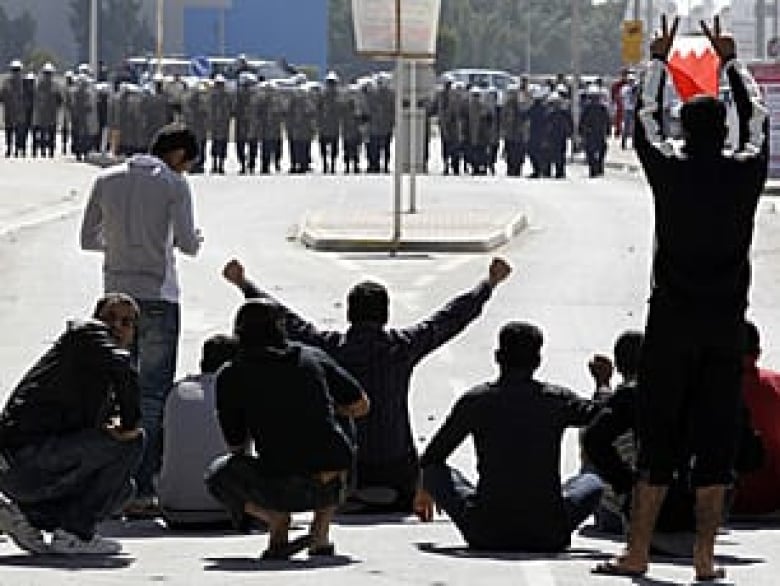Egypt aftershocks rumble through Mideast
Protests in Yemen, Bahrain, Iran gather momentum

Thousands of protesters in Yemen inspired by the upheaval in Egypt continued to demand their president's ouster Monday, while security forces in Bahrain fired tear gas and rubber bullets on demonstrators, and Iranian security forces moved to quash dissent.
More on Egypt uprising
University students, rights activists and legislators marched in Yemen's capital, Sanaa. Lawyers in black robes, led by their union chief, joined the demonstrators shouting "The people want the regime to step down!" The slogan was reminscent of those used in Egypt and Tunisia before Hosni Mubarak and Zine El Abidine Ben Ali were forced out as presidents.
"A revolution of free opinion ... A revolution of freedom ... We who decide," shouted the protesters.
A counter-demonstration by dozens of supporters holding up pictures of Yemeni President Ali Abdullah Saleh confronted the protesters, shouting slogans against terrorism and supporting the government's call for dialogue.
"We will continue our protests until the regime falls," independent lawmaker Ahmed Hashid said.
On Sunday, police armed with sticks and daggers beat back thousands of protesters marching through Sanaa. The protests have mushroomed since crowds gathered Friday to celebrate the ouster of Mubarak after an 18-day revolt fuelled by similar grievances.
Yemen is one of several countries in the Middle East feeling the aftershocks of pro-reform uprisings in Egypt and Tunisia.
Bahrain protesters demand reform
In Bahrain, thousands of anti-government protesters heeded calls to unite in a major rally and bring the Arab reform wave to the Gulf for the first time.

Riot police — some firing birdshot pellets — moved against marchers in various sites to prevent a mass gathering in the capital, Manama, that organizers intended as an homage to Egypt's Tahrir Square, the epicentre of the popular revolt that drove Hosni Mubarak from power.
Bahrain's protesters claim they do not seek to overthrow the ruling monarchy, but want greater political freedoms and sweeping changes in how the country is run.
Social media sites have been flooded with calls by political youth groups, rights activists and others to join demonstrations later Monday, a symbolic day in Bahrain as the anniversary of the country's 2002 constitution that brought pro-democracy reforms such as an elected parliament.
But opposition groups seek deeper changes from the country's ruling dynasty, including transferring more decision-making powers to parliament and breaking the monarchy's grip on senior government posts. Bahrain's majority Shias — about 70 per cent of the population — have long complained of systemic discrimination by the Sunni rulers.
Palestinian cabinet shuffle
Palestinian Prime Minister Salam Fayyad dissolved his cabinet in an emergency meeting on Monday.
The move was intended to prepare for general elections planned later this year, the official Wafa news agency reported. Fayyad now has six weeks to name a new Cabinet.
A Palestinian spokesman denied the shuffle was tied to unrest in the Arab world.
"It's not tied to the new changes in the region," Ghassan Khatib said, adding it was planned weeks ago.
The new cabinet will help implement Fayyad's plan to build Palestinian institutions in preparation for eventual independence, and to prepare for parliamentary and presidential elections, the Wafa statement said.
Click on the squares in the map below to learn more about the protests, which have spread across the Middle East and North Africa.